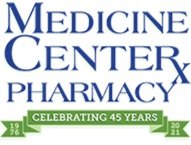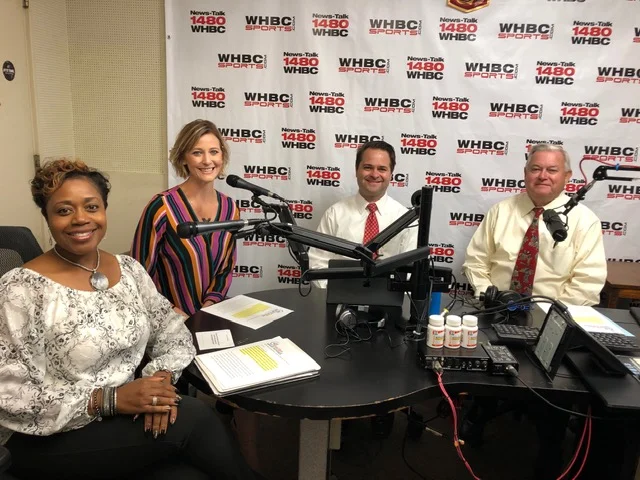Brainology with Great Start for Great Futures
Health Matters with the Medicine Center Pharmacy welcomed our guests Jen Griffing and Krista Allison, members of the Great Start for Great Futures Coalition to discuss Brainology.
One step builds on another. The progress in language development made during the first five years of a child’s life is extremely predictive of future school successes and struggles. Kindergarten readiness predicts 3rd grade reading achievement, which predicts 8th grade math achievement, which predicts high school graduation, which predicts postsecondary attainment. Ninety percent of a child’s brain development occurs by age five. Birth to age three is the fastest rate of brain development across his or her lifetime.
Today’s consensus in the fields of neuroscience, education and developmental psychology reveal that a child’s experiences between birth and age five have an enormous impact on the ability to thrive throughout life; from academic achievement, to health, to future earnings as an adult.
On this podcast we will talk with our friends from the Great Start for Great Futures Coalition about each of our roles in helping the children of Stark County realize their potential for a Great Future.
What is Great Start for Great Futures
Formed in December 2016, The Great Start for Great Futures (GSGF) Coalition is a countywide collective comprised of early education providers, agencies, advocates, and community leaders who collaborate to design and implement initiatives to close the early learning gap in the Stark County community.
The Goal of Great Start for Great Futures Coalition
To ensure all children have access and opportunity to high-quality early education to ensure kindergarten readiness in all (early learning) educational domains
One key point we want our community to remember is that:
You don’t begin at 3~
You don’t begin at 5~
You begin before birth.
So therefore, under our theory of change, we actually have an advantage in closing the achievement and opportunity gap in the areas of literacy, numeracy and social-emotional development for children before birth to age three.
We know that if take advantage of the “advantage” we will see kindergarten readiness and create a solid foundation for academic growth. It’s all about language nutrition.
What is “Language Nutrition”?
Words truly build our brains. Just like our bodies need nourishing foods and clean water, our brains NEED language. They need words to build strong, healthy connections. These connections grow stronger and stronger for children by hearing LOTS of words! Words that are given to them by caring people in the context of their day around things that have the most meaning to them. For example: meal time, riding in the car, playtime, nature, bath time and bedtime….just to name a few. The more meaningful words and conversations the more healthy and stronger connections we create to build our children’s brains. That’s brainology.
Brainology 101 Overview?
Let’s go a little deeper into the term “language nutrition” and brainology. Now we have disclaimer alert- we not medical professionals, but we are educators, parents and community members and we’ve looked at the research behind the connections between early childhood and education.
Here’s what we learned over the last 25 years as a result of research by various scholars in early childhood development in health/medicine, education, economics,
Early childhood is a critical period for developing language skills (listening, speaking and understanding) (Shonkoff & Phillips, 2000)
Language enables a child to communicate with others which builds both social and cognitive development which is a prerequisite of school readiness and literacy (Dickinson and Porche, 2011, Forget-Dubois et al., 2009, Hart and Risley, 1995, Rowe et al., 2012, Weisleder and Fernald, 2013).
The basic architecture of the brain is constructed through an ongoing process that begins before birth and continues into adulthood. (The Science of Early Childhood Development- Harvard)
Babies are able to perceive and react to sound as early as at 24 weeks gestation and begin to learn language in utero by 35 weeks gestation, suggesting that newborn infants' brains are primed to learn language (Kisilevsky et al., 2009, Perani et al., 2011)
Similar to the construction of a house, the building process begins with laying a foundation (The Science of Early Childhood Development- Harvard)
Through this process, early experiences create a foundation for lifelong learning, behavior, and both physical and mental health. A strong foundation in the early years increases the probability of positive outcomes. (The Science of Early Childhood Development- Harvard)
It starts with you. It continues with us.
If you are a parent, talking with your child every day, throughout the day, is one of the most important gifts you can give to ensure healthy growth and development. You are absolutely your child’s first and most important teacher. No one knows or can connect with your child better than you!
It’s in these day to day interactions that children receive the most powerful language nutrition.
Being intentional about using language as a tool to help children grow strong, healthy brains isn’t optional, but necessary for helping children prepare not only to read but to be able to communicate and connect as they develop. Because as we mentioned, we know that the difference in early language exposure really is the beginning of the achievement gap and we can work as a community to proactively address this.
Talk First Stark is about leveraging the power of language to ensure that all families and community members have the tools they need to nourish the growing brains of our children. We know that whatever your role is, you are a powerful partner in impacting the life of a child.
Other Links Of Interest
The Power of Language Nutrition for Children’s Health and Academic Development
The Science of Early Childhood Development
How does nutrition affect the developing brain?
CDC’s Developmental Milestones
Don’t miss Part 1, Part 3 and Part 4 here.
You can find all our Health Matters Podcasts here: iTunes Google Play Stitcher






Health Matters is a weekly radio show sponsored by the Medicine Center Pharmacy on WHBC 1480 AM in Canton, Ohio. This episode pharmacists Brad White and Paul White discuss Remote Learning , Language, Literacy and Health and Wellbeing for the entire family.